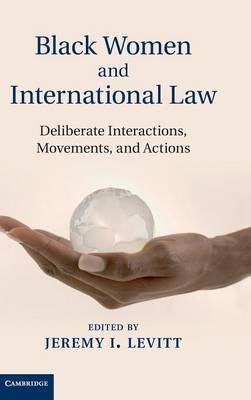
Black Women and International Law
Cambridge University Press (Verlag)
978-1-107-02130-3 (ISBN)
From Compton to Cairo, Bahia to Brixton, black women have been disproportionally affected by poverty, illiteracy, unemployment, discrimination and violence. Despite being one of the largest and geographically dispersed groups in the world, they are rarely referenced or considered as a subject of analysis in international law literature. Thus, it is vital that scholars refashion global discourse by re-conceptualizing international law and relations from their unique experiences and perspectives. This collection covers a broad range of topics and issues that examine the complex interactions - as subjects and objects - between black women and international law. The book critically explores the manifold relationship between them with a view toward highlighting the historic and contemporary ways in which they have influenced and been influenced by transnational law, doctrine, norms, jurisprudence, public policy, public discourse and global governance. It purports to unearth old law and fashion new paradigms born out of the experiences of black women.
Jeremy I. Levitt is Dean and Vice Chancellor's Chair at the University of New Brunswick Law School in Fredericton, New Brunswick, Canada. He recently served as the Distinguished Professor of International Law at Florida A&M University. Professor Levitt is a leading scholar on the international law of the use of force, human rights law, peace studies, and the international law and politics of Africa. In 2012–13, he was the Fulbright Research Chair in Human Rights and Social Justice at the University of Ottawa. He has authored two books, edited four, and written more than thirty academic articles. He recently completed a groundbreaking study titled Illegal Peace Africa: An Inquiry into the Legality of Power Sharing with Warlords, Rebels, and Junta (2012).
1. Judge Gabrielle Kirk McDonald: a biographical note Jeremy I. Levitt; 2. Passing reflections on my journey for justice Gabrielle Kirk McDonald; Part I. Leadership, Human Rights and Peace-Building: 3. Writing black women into political leadership: reflection, trends and contradictions Carole Boyce-Davies; 4. The international human rights of black women: justice or just us? Adrien Wing; 4. Gender parity in the AU women's protocol Fatou Kiné Camara; 5. Law, peace construction and women's rights in Africa: who will safeguard Abeena and Afia? Jeremy I. Levitt; 6. Black women and peacebuilding in international law Anna Spain; Part II. Black Women's Movements: 7. African American women on the world stage: the fourth world conference on women – Beijing Linda Greene; 8. Black women and reparations movements Adjoa Aiyetoro; 9. The work of African women to confront the challenge of climate change Erika George; Part III. Feminine Sovereignty: 10. Black women and reproductive health: a normative inquiry Judith Scully; 11. The nature of black female 'things'; the nature of choice: a meditation on Saartjie Baartman and Truganini Karen Bravo; 12. The transactional costs of transnational sex workers: old regimes, new norms Eleanor Brown.
| Erscheint lt. Verlag | 30.4.2015 |
|---|---|
| Zusatzinfo | 9 Halftones, unspecified; 9 Halftones, black and white |
| Verlagsort | Cambridge |
| Sprache | englisch |
| Maße | 152 x 229 mm |
| Gewicht | 650 g |
| Themenwelt | Recht / Steuern ► EU / Internationales Recht |
| Sozialwissenschaften ► Ethnologie | |
| Sozialwissenschaften ► Politik / Verwaltung ► Europäische / Internationale Politik | |
| Sozialwissenschaften ► Soziologie ► Gender Studies | |
| ISBN-10 | 1-107-02130-8 / 1107021308 |
| ISBN-13 | 978-1-107-02130-3 / 9781107021303 |
| Zustand | Neuware |
| Haben Sie eine Frage zum Produkt? |
aus dem Bereich


